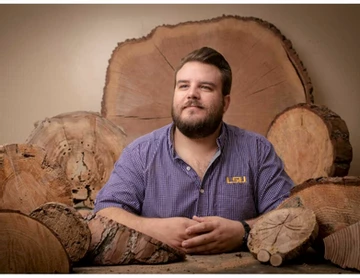
Finishing Your Degree: Steps to Getting Over the Final Hump
A plastic-wrapped desk is a great analogy for grad school too – a constant struggle to get to the finish line, each layer of wrapping getting you closer and closer to the goal of graduation. I’ve just finished my PhD at Louisiana State University, and I am well aware of the trials and tribulations of being a student. This is something students work on (or will be working on) for years, so let’s talk about finishing it.
1) Pick a committee whose goal is for you to finish. Okay, this isn’t something you can do if you’re near the finish line, but for those of you reading who are early in your graduate school career, keep this in mind. Your committee should be dedicated to you finishing your degree, and they should be actively taking steps to help you achieve that goal. Ask current and former students about their experience with these advisors. Never rush this decision; consider it the most important one of your time in graduate school.
2) Write. There’s no length limit on a dissertation or thesis, but let’s be clear: it is going to be longer than the Buzzfeed article you just read, so that means words will have to be written. I like to always begin with figures. After you’ve made a figure, describe everything about it: axes, colors, highs and lows, averages, the time interval, the sample size, correlation coefficients, study areas. These are your results, and now you can discuss them. I always work on my introduction last.
3) Become best friends with your graduate secretary, and stay in touch with your graduate school. Nobody knows the requirements for your degree more than these people, and you have to get through them before you can finish. I often walk to my graduate secretary’s office so we can talk in person, and I deliver things to her on paper so that they can be scanned/copied/delivered/signed immediately. Of course, always CC your advisor on any correspondence.
4) Write some more.
5) This should go without saying, but when someone emails you about your document or about graduation, reply to them IMMEDIATELY. If a committee member sends you comments, drop everything and edit your document. If the graduate school asks for a form to be signed by your department chair, print the document and walk it to her/his office. A rolling stone gathers no moss.
6) Did I mention you should be writing a good bit?
7) Rely on your fellow graduate students for advice, help, and most importantly, a place to vent. Many of them know the professors on your committee, they know the forms to be signed, they know document format guidelines, and they might even know your science. Heck, they can probably even help you make a study area map. Accept their help, and pay it forward!
8) WRITE.
I hope you all have success in finishing your respective degrees. Remember that each of us will leave a desk empty for the next person who comes along, and they will need support just like you did when you first arrived at your plastic-wrapped desk. You will finish, and they will too.
Happy writing,
Clay
About the Author:
Clay Tucker is a tree-ring scientist at Louisiana State University. He graduated with a PhD in Geography in May 2020, and his dissertation research explores climate risk to cypress swamps and pine savannas on the Gulf Coast. He is also the chair of the SWS Student Association Committee. Follow him on Twitter and on his website, or reach out to him directly at ctucke8@lsu.edu.



